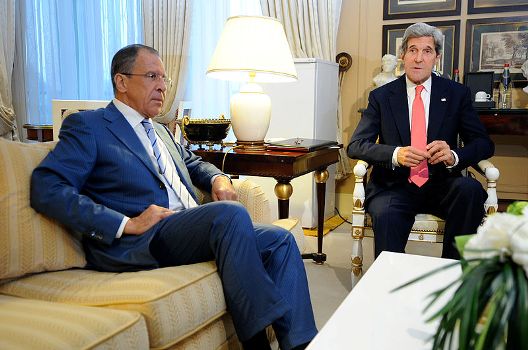 Russian Foreign Minister Sergei Lavrov, either seizing on an off-handed comment by his US counterpart at a press conference in London, or thinking creatively on his own, has proposed that Syria’s chemical stockpile be placed under international supervision and ultimately destroyed. Clearly this is an eleventh hour attempt to encourage Congress to vote “no” on authorizing President Barack Obama to conduct military operations in Syria. If Congress obliges Mr. Lavrov, it will look up and find his last-minute proposal gone with the wind.
Russian Foreign Minister Sergei Lavrov, either seizing on an off-handed comment by his US counterpart at a press conference in London, or thinking creatively on his own, has proposed that Syria’s chemical stockpile be placed under international supervision and ultimately destroyed. Clearly this is an eleventh hour attempt to encourage Congress to vote “no” on authorizing President Barack Obama to conduct military operations in Syria. If Congress obliges Mr. Lavrov, it will look up and find his last-minute proposal gone with the wind.
The possibility that Lavrov has made a serious proposal need not be dismissed. He has, after all, induced Syria’s foreign minister to acknowledge something that his boss, Bashar al-Assad, will not: that Syria owns chemical weapons. Let us assume that Mr. Lavrov truly means business. Why would Assad himself take the proposal seriously if Congress turns its back on the president of the United States?
President Obama will want to do some due diligence on this Russian proposal. If it is real and if the Syrian regime is truly inclined to accept it, there would be not a thing wrong with bringing Syria’s toxic arsenal under international supervision as step one on the way to its ultimate destruction. Although Secretary of State John Kerry noted in London that Assad could avoid military strikes by turning his chemical weaponry over to the international community “next week,” it would likely take months for the necessary protocols and procedures to be arrived at and implemented. Would the Assad regime be free during those months to continue its longstanding campaign of mass terror against civilians, using the conventional weaponry it customarily relies on while chemicals remain under lock and key? Would there be something binding the regime to the end-results Lavrov says he wants to see? Or would this be a process—the sort of thing that goes on and on interminably in the Middle East with no result?
If Congress wishes to see if there is anything real lurking behind this proposal, it will pass the authorizing resolution President Obama seeks. With the authorization in hand Mr. Obama need not strike twenty minutes later. Hypothetically, he need not strike at all. He could and should run to ground anything he thinks is out there in terms of attractive, practical alternatives to a military operation. Indeed, given that the Assad regime has reportedly been moving and hiding delivery systems well-worth destroying, it might make sense for the president to hold fire for awhile anyway, permitting Assad better to appreciate the gravity of his situation as US forces mass and as American diplomats do their due diligence. To the extent that regime artillery, aircraft, rockets, and missiles are buttoned up, they are not killing, maiming, traumatizing, and stampeding civilians. When they come out, they can be killed.
This raises another possibility. If Russia is truly interested in a political way forward, it would also press its client to declare a unilateral ceasefire, invite UN observers, implement the deescalatory and humanitarian steps urged by Kofi Annan in the first half of 2012, and prepare to follow the Geneva formula for political transition. There is no political pathway for Syria as long as the Assad regime sees innocent civilians as lucrative targets. Russia has always claimed that it supported Mr. Annan and his successor, Lakhdar Brahimi. Now there is an opportunity to substantiate that claim.
If, however, Congress kills the authorizing resolution, Assad will politely but pointedly turn aside Lavrov’s chemical stockpile suggestion and return full force to massed fires on population centers he does not control. He may not again resort to chemical weaponry: no doubt the Iranians and Russians are highly irritated by the stupidity of their client, and Assad himself may feel chastened by the fuss he has stirred up and the prospect of US military strikes. Even if Congress takes him off the hook now, enabling him to return to his business as usual of mass terror, Assad may not feel comfortable—at least in the chemical context—making a permanent bet on the cooperation of the United States Congress. Nonetheless, it will be slim comfort indeed for Syrians and their neighbors, who correctly see chemical weapons as the tiny tip of an enormously lethal iceberg.
Frederic C. Hof is a senior fellow with the Atlantic Council’s Rafik Hariri Center for the Middle East.
Image: U.S. Secretary of State John Kerry meets with Russian Foreign Minister Sergey Lavrov to discuss issues related to Syria in Paris on May 27, 2013. (Photo: US State Department)
